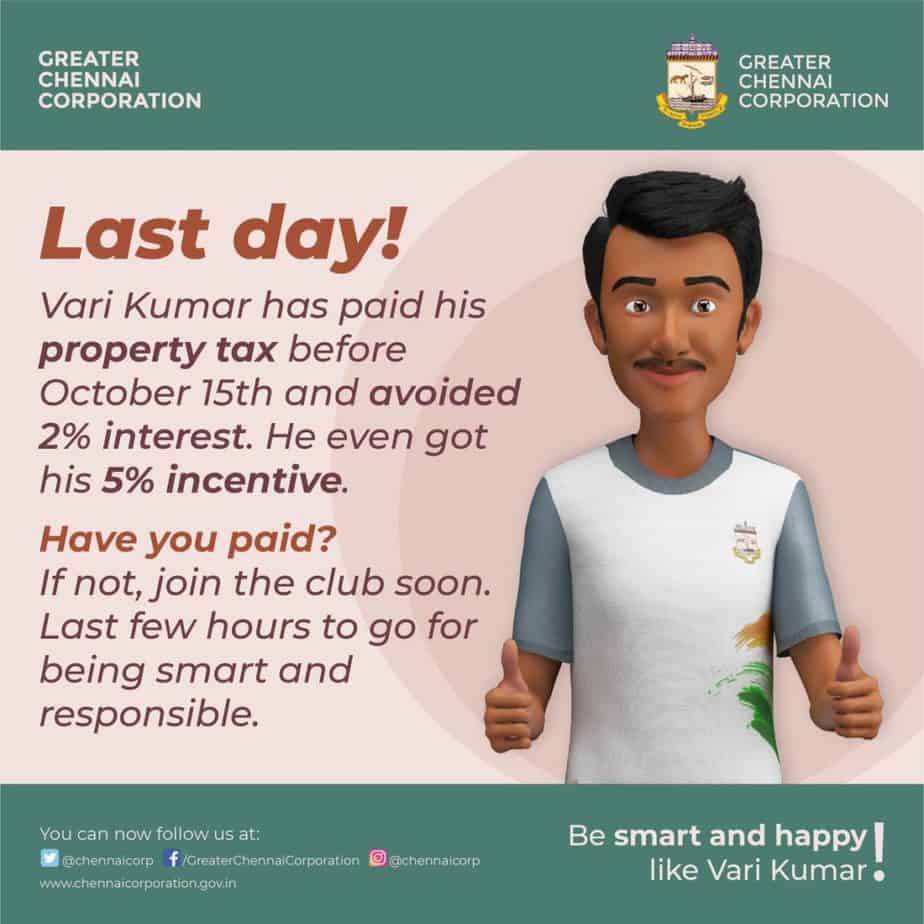Financially, 2020 has been a challenging year for the Greater Chennai Corporation (GCC). COVID-19 has left the civic body cash-strapped as a major chunk of its funds were spent on conducting fever camps, arranging shelter homes and other mitigation measures.
Even as it was battling the COVID crisis, Chennai Corporation had to cope with Cyclone Nivar and needed hundreds of crores to set up relief centres in the low-lying areas. The expenses for the GCC have increased phenomenally, but the sources of funds remain the same.
In an effort to increase revenue, the Corporation is banking on one of its major sources of funds: property tax. Through innovative ways, the 15 teams of GCC have collected a sum of Rs 92 crore as property tax in October 2020, which is almost double the amount collected in October 2019.
“We have made over 1.3 lakh bills, which is four times higher than October last year,” said Deputy Commissioner (Revenue & Finance), Meghanath Reddy.
| Year | Amount collected |
| 2018 | 142 crore |
| 2019 | 132 crore |
| 2020 | 152 crore |
Property taxes are paid in two instalments: April to September and October to March. GCC’s target for the current period (October to March) is 350 crore and the civic body has already managed to collect 152 crore (43.5%) in the first two months of the current period.
It is definitely an achievement on the part of the civic body to have been able to increase the collection by many times, especially when citizens are bearing the brunt of an economy on the decline. “The pandemic dented the economy badly. Even though it is a Herculean task to collect tax from the citizens in this situation, we could do it through people-friendly offers and initiatives,” says Nidhipathi.
Strategies to boost collection
Early bird catches the rebate: GCC proposed an incentive scheme to motivate citizens who pay their taxes within the fifteen days of the tax calendar (1st April to 15th April and 1st October to 15th October). The announcement of 5% rebate for early payers encouraged many to pay taxes within this period. “The strategy has changed public behaviour, who otherwise used to delay paying taxes till March,” said T A Nidhipathi, Assistant Revenue Officer, GCC.
Fines for late payment: Levying a penalty of 0.5% for assessees who pay after the incentive period has worked out well. The penalty amount gets added to the next tax cycle, so that many citizens are driven to pay the taxes during the incentive period. “40% of the assessees in Zone 9 have already paid the taxes,” said M Srinivasan, assessor, GCC.
Think out of the box: Creative interventions also helped GCC with tax collection. Unveiling a mascot called Vari Kumar, the local body encouraged citizens to pay their taxes online at chennaicorporation.gov.in and Namma Chennai mobile application.
From sharing messages on the incentives to creating awareness around online payments, Vari Kumar became the face of GCC’s tax collection. Thanks to him, the social media pages of Corporation were soon filled with queries and suggestions from the general public.
“Thanks to the GCC for effectively communicating messages about paying the tax online. I wouldn’t have known about it if not for Vari Kumar,” said K Rajesh, a Chennaite.

Motivating employees
GCC has 220 tax collectors, 120 assessors and 90 licence inspectors across its fifteen zones. With most citizens typically lethargic about paying taxes on time, theirs is a thankless job.
Keeping that in mind, the revenue department of GCC has introduced the GREAT (GCC Revenue Evaluation and Augmentation Task) league to motivate such officials. The officials of the zone that collect the highest taxes are rewarded every month.
“I have been working in the revenue wing since 2007 and this is the first time we have been acknowledged for our efforts. Now, this drives us to do better every month,” said T A Nidhipathi, who has won the cash prize thrice this year for the highest property tax collection in zone 9.
Discrepancies in the measurement of the property have been a roadblock for GCC. In many cases, assessees try to evade or reduce the payable amounts by undervaluing various parameters such as carpet area, parking area etc.
“GCC’s survey with the list of buildings with the calculated area makes it easy for assessors (like me) to identify the discrepancies during field inspections. Citizens raise objections, but we explain how our measurements are solely based on The Chennai City Municipal Corporation Act. We have added more than 800 assessees in zone 9 itself,” said M Srinivasan.
The cyclone came in the way of property tax collection as GCC officials spent more than ten days in the month of November on relief work. However, they are determined to meet the target this year.
The rebate of offer for property tax payment within the due date may have helped the GCC only to some extent. Because, a majority of residents are prompt in making payment.
Hi, can anyone please help me with how can i apply for property tax assessment online since i demolished and extended the area of contraction. If no options online how to apply for offline assessment and what are the charges for it.